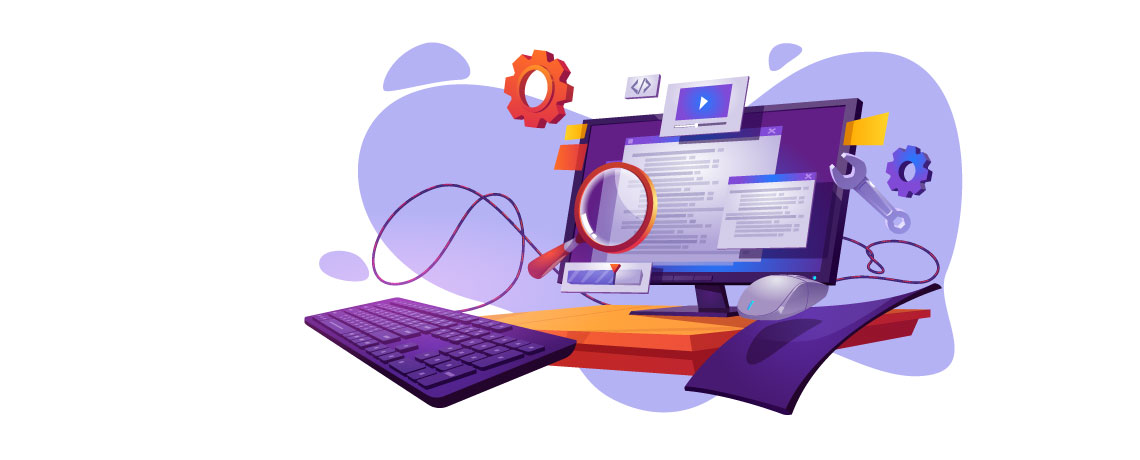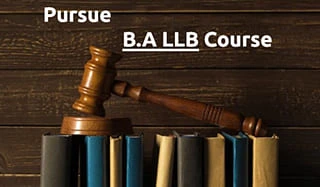BBA Course: Your Pathway to Become a Business Trailblazer

In today’s fast-paced and ever-evolving global business environment, students need to build a solid foundation in management principles and business operations to thrive professionally. The Bachelor of Business Administration is one of the most sought-after undergraduate programmes for students who aspire to make a mark in the business world. It is designed to impart a broad understanding of business fundamentals, including marketing, finance, human resources, operations and entrepreneurship.
BBA equips students with analytical thinking, leadership and decision-making skills, with an emphasis on practical learning, real-world case studies and industry exposure. This course is ideal for those who wish to make their career in corporate management, start their own business, or go on to pursue higher studies such as an MBA. In this blog, we will talk all about what is BBA course?—from subjects to eligibility and everything in between.
BBA Course Details
Given below are the BBA course details:
| Particulars | Details |
|---|---|
| BBA Full Form | Bachelor’s of Business Administration |
| BBA Course Level | Undergraduate |
| BBA Course Duration | 3 years |
| BBA Course Types | Full-time, Part-time, Distance/Correspondence, Online |
| BBA Course Fees | INR 2 Lakhs to 7 Lakhs |
| BBA Course Admission Process | Merit-Based/Entrance-Based |
| BBA Eligibility Criteria | 10+2 in any stream (Science, Commerce, or Arts) in an aggregate of 50% |
| BBA Course Specialisation | Applied Economics & Finance, Computational Business Analytics, Digital Technologies, Entrepreneurship & Family Business Programme, HR, Marketing |
| BBA Job Profiles | HR Executive, Marketing Executive, Marketing Manager, Sales Executive, Research and Development Manager, etc. |
| BBA Average Salary | INR 3 LPA – INR 10 LPA |
| BBA Top Recruiters | Concentrix Corporation, Kotak Mahindra Bank, Royal Bank of Scotland, Accenture, Microsoft, Sony, Tata Consultancy Services, IBM, Hindustan Unilever, ICICI, Banking Industry, Wipro, HDFC Bank Pvt Ltd, Deutsche Bank, Amazon, etc. |
| Examination Type | Semester |
What is BBA Course?
The BBA is an undergraduate degree that provides the knowledge of business basics. It combines business education with accounting, finance, management and marketing courses. If you want to begin working in management immediately upon graduation, this is an appropriate option. Business administration and management are the primary topics taught in courses for a Bachelor of Business Administration degree. If you wish to develop your leadership skills, you can opt for this course.
BBA Full Form
The full form of BBA is Bachelor of Business Administration. It is one of the most popular programmes for those who are interested in business, economics and management studies.
BBA Course Duration: Different Types
The BBA course usually spans three years and it is divided into six semesters. Some of the universities also offer integrated programmes or allow flexibility in duration through part-time or distance learning modes. Given below is the type of BBA course and its duration:
| Course Type | Duration |
|---|---|
| Full-time BBA | 3years(6 semesters) |
| Part-time BBA | 3-4 years |
| Distance BBA | 3-5 years |
| Integrated BBA+MBA | 5 years |
Why Choose a BBA Course?
Given below are the reasons why you should choose the BBA course:
Comprehensive Learning:
The BBA curriculum encompasses various fields, such as marketing, finance, human resources and operations.
Career Flexibility:
Graduates have the opportunity to explore roles in various industries or pursue advanced studies.
Skill Development:
Ranging from leadership to analytical skills, a BBA programme sharpens abilities essential for professional growth.
Required Skills for the Bachelor of Business Administration Course
The Bachelor of Business Administration stands as a vital course for students. A BBA teaches skills that support your educational and professional development regardless of your career path. Given below are some of the required skills for the BBA course:
- Consulting
- Problem-solving Skills
- Selling & Negotiating
- Persuading Skills
- Leadership & Management skills
- Self-motivated
- Critical & Analytical Thinking
- Behavioural & Communication Skills
- Writing Skills
- Team Player
- Corporate Etiquette
- Decision Making
BBA Eligibility Criteria
Candidates must meet the following criteria to be eligible for admission to a BBA programme:
- Educational Qualification:
10+2 or equivalent from a recognised board.
- Minimum Marks:
60% to 80% aggregate, which may vary by college.
- Stream:
Open to students from all streams, such as Science, Commerce and Arts.
- Entrance Exams:
Some colleges may consider entrance exams like CUET or conduct their own tests.
BBA Admission Process
Given below are the steps for the BBA admission process:
Submission of Application:
For application submission, candidates need to fill out the form through online or offline channels while providing personal information, educational details and necessary supporting documents.
Entrance Exam (if applicable):
Universities and colleges organise their own entrance exams to evaluate the candidacy of BBA students through logical reasoning tests, quantitative aptitude and general knowledge, along with English language ability.
Merit-Based Selection:
Merit lists are prepared by colleges and universities on the basis of performance in entrance exams (if any) and/or the academic records of the candidate to shortlist the candidate for the subsequent rounds of the admission procedure.
Personal Interview:
The shortlisted candidates are asked to attend a personal interview and/or group discussion to assess their communication skills, problem-solving capabilities and fitness for the course.
Final Admission Offer:
After finishing the admission process, universities send final admission offer letters to selected candidates.
How to Choose the Top BBA College?
Choosing the right BBA college is important for building a solid foundation and achieving future success. Evaluate different factors to make sure the institution aligns with your career aspirations and personal preferences. Consider the following factors:
- Reputation and Ranking
- Faculty qualifications and experience
- Infrastructure and facilities
- Placement records
- Curriculum and specialisations offered
- Alumni network
- Pedagogy for teaching
BBA Course Syllabus and Subjects
The syllabus of the BBA course generally includes a broad spectrum of topics to make the students understand business management practices and concepts fully. Some major topics covered in the BBA syllabus are:
| Semester | Courses |
|---|---|
| 1 | Principles of Management, Business Mathematics, Microeconomics, Business Communication, Financial Accounting |
| 2 | Organisational Behaviour, Business Statistics, Macroeconomics, Marketing Management, Cost Accounting |
| 3 | Human Resource Management, Financial Management, Business Research Methods, Operations Management, Business Law, Elective |
| 4 | Entrepreneurship Development, Production and Operations Management, Management Information System (MIS), Corporate Finance, Elective, Summer Internship/Project Work |
| 5 | Strategic Management, International Business, Supply Chain Management, Project Management, Elective, Minor Project Work |
| 6 | Business Ethics and Corporate Governance, Digital Marketing, Retail Management, Financial Derivatives and Risk Management, Elective, Major Project Work |
BBA Specialisations
The best aspect of the BBA course is that you have a choice of specialisations. These specialisations will offer you a range of career opportunities once you complete your undergraduate degree. So, make sure that you learn the basics of each and then select the one that fascinates you the most.
Following are some of the Top specialisations in the BBA Degree Courses:
- BBA Finance
- BBA Marketing
- BBA Aviation
- BBA Accounting
- BBA Operations
- BBA Tour and Travel Management
- BBA Banking and Insurance
- BBA Computer Applications
- BBA E-Commerce
- BBA Information Technology
- BBA Communication and Media Management
- BBA Rural Management
- BBA Hospital and Healthcare Management
- BBA Foreign Trade
- BBA (Applied Economics & Finance)
- BBA (Computational Business Analytics)
- BBA (Digital Technologies)
- BBA (Entrepreneurship & Family Business Programme)
BBA Entrance Exams
BBA entrance exams in India can help you gain admission to the best business schools. Given below are some of the most common ones:
| Exam Name | Conducting Body | Eligibility Criteria |
|---|---|---|
| CUET- Common University Entrance Test | National Testing Agency (NTA) | 12th pass |
| IPMAT- Integrated Programme in Management Aptitude Test | IIM Indore / IIM Rohtak | 12th pass |
| AIMA UGAT- Undergraduate Aptitude Test | All India Management Association (AIMA) | 12th pass |
| DUET- Delhi University Entrance Test | Delhi University | Graduate with 50% aggregate |
Please note that entrance exams may differ depending on the university you are applying to. It is wise to verify the admission requirements of the schools that appeal to you.
Higher Studies Options After BBA
Graduates often choose to pursue further education to deepen their business acumen and improve their job prospects. Given below are some of the common higher study options after BBA:
| Course | Description |
|---|---|
| MBA | Master of Business Administration, a most popular choice |
| PGDM | Post Graduate Diploma in Management |
| M.Com | Master of Commerce |
| LLB | Law Degree for specialisation in corporate law |
| CFA/CA/CS | Professional courses in finance and accounting |
BBA Course Fees
The BBA course fees differ from university to university. Also, there are some factors that affect the fees; some of them are the institution type, the facilities offered and the location. Given below are the general BBA course fees:
| Institution Type | Annual Fee Range (INR) |
|---|---|
| Government Colleges | 10,000 – 50,000 |
| Private Colleges | 50,000 – 3,00,000 |
| Top-tier Institutes | 2,00,000 – 5,00,000 |
BBA Scope
In the long term, the course provides ample opportunity for personal as well as professional growth. You will learn the confidence and abilities needed to properly kick-start your career because it weaves business-oriented information together with a global strategy for knowledge and training.
Jobs can be obtained in almost every corporate or government department with a BBA degree. Besides providing security, a decent salary and chances for professional growth, it provides work in various domains, including:
- Finance
- Banking
- Sales & Marketing
- Export Companies
- Advertising
- Consultancy
- Research & Development
- Digital Marketing
- Media and Entertainment
- Information Technology (IT)
- Manufacturing and more.
Top Companies Hiring Bachelor of Business Administration Graduates
Given below are some of the best companies that hire BBA graduates:
- Concentrix Corporation
- Kotak Mahindra Bank
- Royal Bank of Scotland
- Accenture
- Microsoft
- Sony
- Tata Consultancy Services
- IBM
- Hindustan Unilever
- ICICI
- Banking Industry
- Wipro
- HDFC Bank Pvt Ltd
- Deutsche Bank
- Amazon
BBA Career Options
A BBA degree equips graduates with a broad range of career options for employment across various industries. Some of the most sought-after jobs for BBA graduates are:
- Management Trainee/Executive: Graduates begin their career as management trainees or executives within firms, wherein they are engaged in various kinds of roles in sales, marketing, finance, operations, or human resources, depending on their speciality.
- Financial Analyst: BBA graduates with a finance background and analytical aptitude can specialise as financial analysts, where they review financial information, prepare reports and offer recommendations to aid investment decisions.
- Marketing Coordinator/Manager: Marketing specialists can serve as marketing coordinators or managers, whose job is to create and execute marketing strategies, conduct market research and oversee promotional activities to entice customers.
- Human Resource Specialist: BBA holders with a concentration in human resource management can seek employment as HR specialists, where they manage recruitment, employee relations, performance management, training and development programmes within organisations.
- Operations Manager: Operations management graduates can seek jobs as operations managers, who manage the production process, allocate resources in an efficient manner and maintain the smooth operation of business activities.
BBA Salary
Salaries for BBA graduates mostly depend on the job role, location, experience and the recruiting company. Given below is the BBA average salary:
| Job Role | Average Salary (INR per annum) |
|---|---|
| Business Analyst | 4 – 6 LPA |
| Marketing Executive | 3 – 5 LPA |
| Financial Analyst | 4.5 – 6.5 LPA |
| HR Executive | 3 – 4.5 LPA |
| Management Trainee | 3 – 5 LPA |
BBA vs Bcom – Comparison
Both BBA and BCom are prominent undergraduate programmes. However, they cater to different career objectives. Given below is the comparison of BBA vs B.Com :
| Criteria | BBA | BCom |
|---|---|---|
| Full Form | Bachelor of Business Administration | Bachelor of Commerce |
| Focus Area | Business and Management | Commerce, Accounting & Finance |
| Suitable For | Aspiring Managers, Entrepreneurs | Accountants, Finance Professionals |
| Core Subjects | Marketing, HR, Strategy | Economics, Taxation, Auditing |
| Postgraduate Options | MBA, PGDM, LLB | CA, M.Com, CMA |
| Career Roles | Managerial Positions | Finance & Accounting Roles |
Unlock Your Business Potential: Why Mahindra University is the Smart Choice for Your BBA
Choosing the right university is a crucial step toward building a successful career in business. Mahindra University, with its forward-thinking approach and strong global partnerships, provides an ideal environment for students who aspire to become future business leaders. The BBA programme at Mahindra University blends academic excellence with real-world experience, equipping students with the skills and knowledge needed to thrive in today’s competitive world.
- Global Academic Collaboration with Cornell University
The School of Management at Mahindra University has a strategic partnership with Cornell University’s SC Johnson School of Business, USA. This collaboration influences curriculum design, faculty mentoring and includes opportunities for student immersion programmes at Cornell’s Ithaca campus.
- Industry-Aligned Curriculum
The BBA programmes are crafted to meet current industry demands, focusing on areas like digital technologies, business analytics and entrepreneurship. This ensures graduates are equipped with relevant skills for the modern business landscape.
- Expert FacultyThe university boasts a diverse faculty with rich academic and industry experience, including backgrounds from IITs, IIMs and top global institutions. Their expertise bridges theoretical knowledge with real-world application.
- State-of-the-Art Infrastructure
Mahindra University provides advanced facilities, including modern classrooms, well-equipped laboratories, extensive libraries and comfortable accommodation, creating an environment conducive to learning and innovation.
- Strong Industry Connections
Being part of the Mahindra Group, the university offers students unique exposure to industry practices through internships, projects and mentorship, enhancing their practical understanding and employability.
BBA Specialisations that Mahindra University Offers:
Conclusion
A Bachelor of Business Administration serves as more than book knowledge since it provides students access to multiple professional paths within the business sector. Through its interdisciplinary structure, the BBA course provides students with essential groundwork for emerging as future business leaders through practical instruction and multiple specialisation tracks.
A Bachelor of Business Administration serves as your initial path toward achieving business or management success whether you begin your career directly from graduation or plan to continue your studies. Mahindra University builds the ideal foundation for your professional future through expert academics combined with business network ties and entrepreneurial and innovative educational programmes. Apply today and take the first step toward a brighter future in business!
FAQs
What is the eligibility criteria for a BBA course?
The eligibility for a BBA course is that students must have completed 10+2 from a recognised board with at least 50–60% marks. Some universities may also conduct entrance exams.
Can I pursue BBA after studying Science or Arts in 12th?
Yes, you can pursue a BBA. It is open to students from all streams, whether it is Science, Commerce, or Arts.
What are the career options after completing a BBA?
BBA graduates can work as marketing executives, financial analysts, HR coordinators, operations executives and business development managers.
Is BBA better than B.Com?
It depends on your career goals. BBA is better suited for management and business roles; on the other hand, B.Com is ideal for those who want to make their career in finance, accounting and taxation.


















































































































































































![Arm_Yourself_with_Deep_Business_Knowledge_&_Insights_with_PhD_Program_in_Business_Administration_at_Mahindra_University[1] Arm_Yourself_with_Deep_Business_Knowledge_&_Insights_with_PhD_Program_in_Business_Administration_at_Mahindra_University[1]](https://www.mahindrauniversity.edu.in/wp-content/uploads/2023/04/Arm_Yourself_with_Deep_Business_Knowledge__Insights_with_PhD_Program_in_Business_Administration_at_Mahindra_University1.jpg)
![Emerge_as_a_Forward_thinking_Mechanical_Engineer_with_B_1140x460[1] Emerge_as_a_Forward_thinking_Mechanical_Engineer_with_B_1140x460[1]](https://www.mahindrauniversity.edu.in/wp-content/uploads/2023/04/Emerge_as_a_Forward_thinking_Mechanical_Engineer_with_B_1140x4601.jpg)
![B.Tech_in_Computer_Science_Engineering_(BTech_CSE)_Your_Gateway_to_Become_a_Computer_Genius_1140x460[1] B.Tech_in_Computer_Science_Engineering_(BTech_CSE)_Your_Gateway_to_Become_a_Computer_Genius_1140x460[1]](https://www.mahindrauniversity.edu.in/wp-content/uploads/2023/04/B.Tech_in_Computer_Science_Engineering_BTech_CSE_Your_Gateway_to_Become_a_Computer_Genius_1140x4601.jpg)
![Digital_Marketing_is_Booming_Globally_1140x460[1] Digital_Marketing_is_Booming_Globally_1140x460[1]](https://www.mahindrauniversity.edu.in/wp-content/uploads/2023/04/Digital_Marketing_is_Booming_Globally_1140x4601.jpg)
![MU_Electrical20Computer20Engineering_1140x460[1] MU_Electrical20Computer20Engineering_1140x460[1]](https://www.mahindrauniversity.edu.in/wp-content/uploads/2023/04/MU_Electrical20Computer20Engineering_1140x4601.jpg)
![BA_LLB_Hons_Course_at_Mahindra_University[1] BA_LLB_Hons_Course_at_Mahindra_University[1]](https://www.mahindrauniversity.edu.in/wp-content/uploads/2023/04/BA_LLB_Hons_Course_at_Mahindra_University1.webp)
![Management_&_Business_Administration_is_Tremendously_High[1] Management_&_Business_Administration_is_Tremendously_High[1]](https://www.mahindrauniversity.edu.in/wp-content/uploads/2023/04/Management__Business_Administration_is_Tremendously_High1.jpg)

![whyistraining&placementcellimportant[1] whyistraining&placementcellimportant[1]](https://www.mahindrauniversity.edu.in/wp-content/uploads/2023/04/why20is20training2020placement20cell20important1.png)
![TheDifferencesbetweenRights&Duties[1] TheDifferencesbetweenRights&Duties[1]](https://www.mahindrauniversity.edu.in/wp-content/uploads/2023/04/The20Differences20between20Rights2020Duties1.png)
![sleep_deprivation[1] sleep_deprivation[1]](https://www.mahindrauniversity.edu.in/wp-content/uploads/2023/04/sleep_deprivation1.jpg)
![SelfLoveBlogImage2[1] SelfLoveBlogImage2[1]](https://www.mahindrauniversity.edu.in/wp-content/uploads/2023/04/Self20Love20Blog20Image2021.png)























































































































